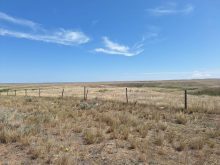A U.S. appeals court on June 24 left in place an injunction barring Monsanto from selling its Roundup Ready alfalfa seed until the government completes an environmental impact study on how the genetically modified product could affect neighboring crops.
The Ninth Circuit Court of Appeals rejected the company’s request for a rehearing of its appeal and said it would accept no more petitions for rehearing in the three-year-old case.
Monsanto’s only remaining avenue appears to be U. S. Supreme Court review.
Read Also

Farming Smarter receives financial boost from Alberta government for potato research
Farming Smarter near Lethbridge got a boost to its research equipment, thanks to the Alberta government’s increase in funding for research associations.
Monsanto spokesman Garrett Kasper said the company was “disappointed” by the appeals court ruling “but we are considering our legal options and one of them could include a request for review by the Supreme Court.”
Roundup Ready alfalfa is not a “core crop platform” for Monsanto, and the outcome of this case will have little or no impact on the company’s May 13 forecast that its U.S. gross profit from sales of seeds and traits will double by 2013, spokesman Lee Quarles said.
George Kimbrell, staff attorney for the Center for Food Safety, called the ruling “a major victory for consumers, for farmers and for the public as far as protecting their rights to … to sow the crop of their choice and … eat the food of their choice.”
Kimbrell, whose group is a plaintiff in the case, predicted that Monsanto’s chances of getting Supreme Court review of the case were “slim to none and slim just left town.”
Environmental groups and conventional seed companies, led by Geertson Seed Farms, sued the U. S. Department of Agriculture in February 2006 to force it to rescind its 2005 approval of the Monsanto seed until it does a full environmental study.
Monsanto intervened on the government’s side in the suit.
The plaintiffs claimed cross pollination of genetically modified crops could contaminate conventional alfalfa fields and overuse of the herbicide Roundup, which the seeds were bred to resist, could foul soil and groundwater or give rise to Roundup-resistant “super weeds.”














